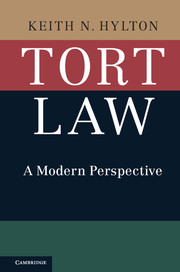Book contents
- Frontmatter
- Contents
- 1 Introduction
- 2 Policy and Tort Law
- 3 Evolution of Tort Law
- 4 Intentional Torts
- 5 Theoretical Foundations of Strict Liability
- 6 The Reasonable Person
- 7 Customs, Statutes, and the Reasonable Person
- 8 Inferring Negligence
- 9 Contributory Negligence and Assumption of Risk
- 10 Contributory Negligence, Comparative Negligence, and Incentives for Care
- 11 Joint and Several Liability, and Vicarious Liability
- 12 Factual Causation
- 13 Proximate Cause
- 14 Duty to Rescue and Special Relationships
- 15 Strict Liability: Conversion, Abnormally Dangerous Activities, and Nuisance
- 16 Defamation
- 17 Products Liability
- 18 Damages
- Index
18 - Damages
Published online by Cambridge University Press: 05 June 2016
- Frontmatter
- Contents
- 1 Introduction
- 2 Policy and Tort Law
- 3 Evolution of Tort Law
- 4 Intentional Torts
- 5 Theoretical Foundations of Strict Liability
- 6 The Reasonable Person
- 7 Customs, Statutes, and the Reasonable Person
- 8 Inferring Negligence
- 9 Contributory Negligence and Assumption of Risk
- 10 Contributory Negligence, Comparative Negligence, and Incentives for Care
- 11 Joint and Several Liability, and Vicarious Liability
- 12 Factual Causation
- 13 Proximate Cause
- 14 Duty to Rescue and Special Relationships
- 15 Strict Liability: Conversion, Abnormally Dangerous Activities, and Nuisance
- 16 Defamation
- 17 Products Liability
- 18 Damages
- Index
Summary
Damages traditionally have been classified under two categories: compensatory and punitive. Compensatory damages are awarded to compensate plaintiffs for losses suffered as the result of some tort. Punitive damages are awarded to plaintiffs to punish and deter tortfeasors.
COMPENSATORY DAMAGES
Compensatory damages can be subdivided into pecuniary and nonpecuniary awards. Pecuniary damages compensate plaintiffs for provable objective losses, such as lost wages and medical expenses. Nonpecuniary damages compensate plaintiffs for emotional injuries, often described as pain and suffering.
Some courts have said that compensatory damages serve the purpose of restoration, that is, to restore the plaintiff, as much as possible, to the level of utility he had obtained before the tort occurred. Since individual utility is impossible to measure, the restoration goal has been a persistent source of controversy in the calculation of compensatory damages.
Pecuniary Damages
For the most part, there is relatively little controversy surrounding pecuniary damages. If a plaintiff comes to court with proof that he suffered $10,000 in medical expenses as a result of the defendant's tort, the defendant will be held liable for those expenses. Questions regarding adequacy of proof may arise, but these are issues of evidence and not of tort law.
Probably the most important exception in the law governing compensatory damages is that for economic harms. Economic harms, such as the loss of a profitable opportunity, can be objectively determined in most cases. In spite of this, the general rule is that damages for purely economic harms caused by negligence are not recoverable in the absence of a physical impact or physical injury. To the extent that this rule is grounded in theories of proximate causation, it is not applicable to intentional torts (Vosburg v. Putney, Chapter 4). For example, an economic loss resulting from a false imprisonment, with no physical impact, is recoverable.
Nonpecuniary Damages
In comparison to pecuniary damages, nonpecuniary damages are controversial because of the absence of an objective measure of harm. If a tort victim is left a quadriplegic as the result of an accident, how should a court measure the emotional harm suffered by the victim?
In addition to the controversy over measurement, there is a broad exclusion from recovery for pure emotional injury caused by negligence, similar to the general denial of recovery for pure economic losses caused by negligence.
- Type
- Chapter
- Information
- Tort LawA Modern Perspective, pp. 377 - 434Publisher: Cambridge University PressPrint publication year: 2016



